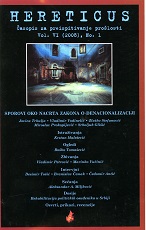Stranputice denacionalizacije u Srbiji
Downfalls of denationalisation in Serbia
Author(s): Jovica TrkuljaSubject(s): Law, Constitution, Jurisprudence
Published by: Centar za unapređivanje pravnih studija
Keywords: legal overcoming of the authoritarian past in Serbia; Rechstaat; lustration; rehabilitation; right to restitution - denationalisation; Restitution of Property Act
Summary/Abstract: The restitution of property is one of the most significant steps of the democratic government after of the overthrow of the authoritarian regime. It represents an important presumption for the political and moral recovery of the Serbian society which was for decades under the thumb of an authoritarian, partisan state and the condition for building the modern democratic society. The Restitution of Property Act and following acts which should mark a break with the practice of violation of human rights in the past long since became reality in other transitional countries. In Serbia seven years after the fall of the Milosevic authoritarian regime there is still no social consensus concerning the adoption of a Restitution of Property Act; thus, Serbia is today the only post communist country in South East Europe which did not pass a Restitution of Property Act. In this context the Government of the Republic of Serbia through the competent ministry, the Ministry of Finance, referred for a public debate on the draft Restitution of Property Act. The public debate lasted during October and November 2007. This article is the overview of author's presentation at the round table of the magazine Hereticus concerning the draft act. On that occasion the author dealt with the issue of restitution as a measure of legal overcoming of the authoritarian past in Serbia and tried to enlighten the audience on the causes of long delays of Serbia in passing this important act.
Journal: HERETICUS - Časopis za preispitivanje prošlosti
- Issue Year: 2008
- Issue No: 1
- Page Range: 7-15
- Page Count: 9
- Language: Serbian

